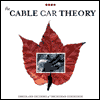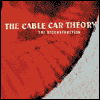|
Biography
John watches the news. Something makes him mad. He writes words.
John gets a fit of depression. He writes other words. Sad words.
John watches Dune while he practices his guitar. John discovers
patterns he likes. Then he works the angry or sad words into the
Dune guitar music. John then presents the band with these "parts"
The band then makes fun of him for being a geek. A fight ensues
in which John always ends up crying in a corner with red eyes
and hot wet snot running from his nose into his mouth. The band
then apologizes, and the practice resumes. They listen, John wins,
and The Cable Car Theory makes good music. End of process.
Ahhh yes, the essence of a band, the creative process at work
- often difficult to describe, at times troubling to relate to,
but always the key to great music. So, The Cable Car Theory choose
to avoid the trappings of intellectual excess and verbal diarrhea
when describing their creative process, but much like their music,
the answer is concise, gripping and endearingly entertaining.
Formed in Staten Island in May of 1997 by singer/chief songwriter
John Farag, bassist Brian Galvin and then-drummer Sean McCann,
The Cable Car Theory quickly acquired guitarist Nicholas Carlucci
and began playing hardcore and punk shows throughout the NYC area.
After a few changes at the drummer position, The Cable Car Theory
began to seriously gel as a unit. Influenced equally by the NYC
and DC hardcore bands they grew up with and one another, CCT went
about creating their own distinct take on good, aggressive, melodic
music. "We try to incorporate the styles of those we respect into
our own music," explains Farag, " we want our sound to be a culmination
of the music we love and the music we want to make."
The music that appears on The Deconstruction is a little bit of
both; at times brutal, at times earnest, but always familiar -
both engaging and challenging the listener. Upon entering Big
Blue Meenie Studios in early August of 2001, the band faced the
dubious task of translating the power and energy of their live
performance to tape. "Recording allows us the opportunity to manipulate
the aural experience of our art, but the trick is to not over
indulge in the ear candy," says Farag. Their commitment to maintaining
the purity of their sound is evident on such standout tracks as
"Nakama", the albums's opener, which combines an early U2-style
guitar riff with an impassioned vocal delivery that is one half
Mike Ness and one half pure desperation. "Caffeine Battle Cry"
is a minute and thirty-five seconds of sonic bombast with a wonderfully
twisted lyrical slant in which Farag is both "a first kiss in
January snow" and "a virus tearing your insides out". CCT rips
through "Whispers", a track ripe with tight tempo changes that
start and stop on a dime, with both a precision and looseness
that displays their musical talents and emotional depth.
While they enjoyed their time recording The Deconstruction, it
is playing live that is truly their passion. "On a record you
can't feel things that you can see at a show - like which song
the guitar player takes home with him every night and dreams about
playing at the next show or the interaction we have with the audience,"
continues Farag, "playing music isn't just a thing for us, it
is a release for us and for the listener." And there is no denying
their music's impact upon first listen. Much like their name (an
analogy for each and every one of our trips through life), The
Cable Car Theory take the listener on a musical journey and arrive
at a crossroads where musical passion and social conscience collide
with unabashed sonic resonance.
Click here to read their
statement about their break-up.
|
 |


|